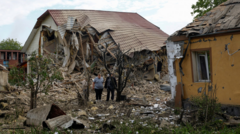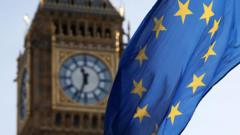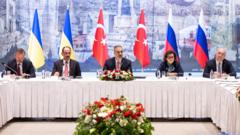Lithuanian prosecutors have accused Russia's GRU of being behind an arson attack on an Ikea store, leading to arrests of two Ukrainian teens. This incident is seen as part of a broader campaign of sabotage attributed to Russian intelligence across Europe.
Lithuania Blames Russia for Arson Attack on Ikea Store in Vilnius

Lithuania Blames Russia for Arson Attack on Ikea Store in Vilnius
Prosecutors allege Russian military intelligence orchestrated the fire, leading to two arrests in Ukraine and Poland.
Lithuanian authorities are raising alarms again as they allege that the Russian military intelligence service, commonly known as the GRU, was responsible for an arson attack on an Ikea store in Vilnius last year. Prosecutor Arturas Urbelis has labeled this incident an "act of terrorism," claiming that investigations into intermediaries have established connections to Russia's military and security services.
Two teenage Ukrainian suspects have been detained, one apprehended in Lithuania and the other in Poland. Poland's Prime Minister, Donald Tusk, reacted to the news, asserting that Lithuania's findings support suspicions that the secret services of Russia are involved in orchestrating a string of fires in shopping centers in both Vilnius and Warsaw. Tusk remarked that it's crucial information ahead of future negotiations, suggesting ongoing hostilities from what he described as "this state."
Russia has consistently denied such accusations from NATO countries, which have claimed that Russian secret services are actively engaging in sabotage throughout Europe. Earlier in July, a series of parcel fires targeting courier companies in Europe were attributed to Russia, with security experts interpreting it as a deliberate strategy of "hybrid warfare" aimed at destabilizing European support for Ukraine amid the ongoing invasion that began in February 2022.
The fire at the Ikea store in May did not result in any casualties; however, a similar incident that month culminated in significant damage when a massive shopping mall in Warsaw was set ablaze. According to prosecutor Urbelis, the two arrested teens had secretly convened in Warsaw, where they planned to ignite fires at shops across Lithuania and Latvia in exchange for a reward of €10,000 (approximately $11,000) and a BMW.




















